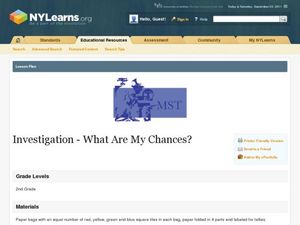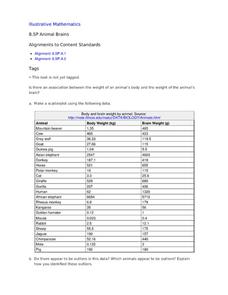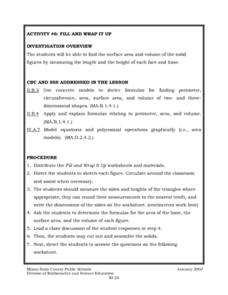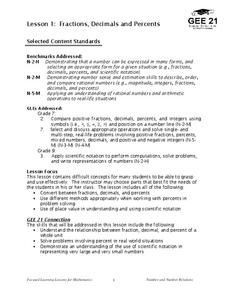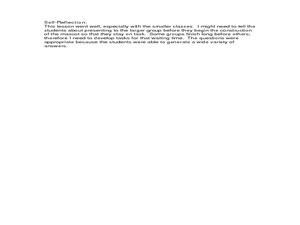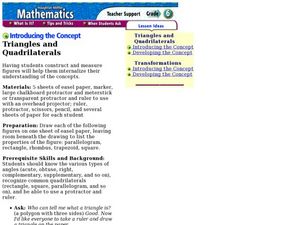Illustrative Mathematics
The Intersection of Two Lines
Here is an introduction to solving simultaneous linear equations. Start by drawing a line through two points. Create a second line which goes through the intersecting point. Background knowledge of how to find the equation of a line and...
Curated OER
Investigation--What Are My Chances?
Seventh graders investigate theoretical and experimental probability by conducting a series of experiments with multiple trials, comparing results, combining results and making conclusions. They express probabilities as fractions,...
Curated OER
Animal Brains
Do big bodies make big brains? Let your learners decide whether there is an association between body weight and brain weight by putting the data from different animals into a scatterplot. They can remove any outliers and then make a line...
Curated OER
Que Tiempo Hace Alli?
Hace calor! Use hand signals to accompany weather-related vocabulary. Learners will remember the vocabulary better! They'll then research weather around the world and record it on a chart provided. Add a math component to this plan by...
Illustrative Mathematics
Calculating the square root of 2
Does a calculator give you the exact value of the square root of 2? Here, learners must decide if 1.414236 is equal to the square root of 2. They must also explain why the square root of 2 could never be equal to a terminating decimal....
Illustrative Mathematics
Rectangle Perimeter 2
While this activity is centered around expressions that represent the perimeter of a rectangle, it also hits at the fundamental concept of equivalent expressions, simplifing expressions, and like-terms. Classmates express their...
Illustrative Mathematics
Mr. Brigg's Class Likes Math
A quick discussion question that brings some collaboration into your classroom will allow your thinkers to make a decision about sampling. Mr. Briggs wants to know if the results from his class are a valuable comparison to the entire...
Nuffield Foundation
Angles
Your learners practice the foundations of measuring two-dimensional angles. As well as the explanation of how to measure angles and their classifications, learners have plenty of practice problems on this worksheet.
02 x 02 Worksheets
Proportions
Cut-and-paste a great activity into your lesson plans. Scholars analyze real-world problems involving proportions. To change things up a bit they cut-and-paste quantities to create a proportion on their way to solving the problems.
Illustrative Mathematics
Comparing Temperatures
Which is colder -12 or -18? Temperature is natural real-world application of ordering rational numbers. It's also fun to talk about the lowest recorded temperature on Earth. Take the time to discuss this inquiry with your class.
Curated OER
Investigation - Looking For Triangles
Seventh graders investigate a series of triangles, looking for patterns and generalizing what they have found. They analyze the pattern data and organize it into a table and graph. Students identify the relationship and discover the rule...
Teachers.net
Solving Equations Using Variables
Middle-schoolers solve linear equations with one single variable. They solve equations that are randomly generated using index cards. Half of an equation is written on each card and distributed to the class. which then attempts solve...
Pennsylvania Department of Education
Fractional Parts Using an Area Model
Learners explore multiplying fractions and their relationship to parts of a whole. They draw and shade fractional parts to show parts of a whole and fractional parts of a fraction. Pupils also use an Internet site for interactive...
Curated OER
Ordering Rational Numbers and Finding Their Approximate
Middle schoolers explore the concept of ordering rational numbers on a number line. They represent rational numbers as decimals and percents. Pupils create a foldable about converting fractions to decimals to percents, and use a...
Curated OER
Investigation-How Many Toothpicks?
Seventh graders use toothpicks to investigate a series of designs and identify patterns. Data is organized and analyzed using tables and graphs, and students make generalizations using algebraic expressions.
Curated OER
Investigation- More than 4- Less than 5
Seventh graders practice combining decimals and fractions to find sums which are either greater than 4 or less than 5. Students first approximate the value of each fraction and decimal, then they look for combinations to fit the guidelines.
Utah Education Network (UEN)
Simplifying Algebraic Expressions
Sixth and seventh graders explore the concept of simplifying algebraic expressions. They review the order of operations and apply properties to simplify and compare them. The author suggests using a "Boxes Game" as a motivator to get...
Curated OER
Fill and Wrap It Up
Students find the surface area and volume of the solid figures by measuring the length and the height of each face and base. They use concrete models to derive formulas for finding perimeter, circumference, area, surface area, and volume...
Curated OER
A Fibonacci Primer
Upper graders explore the Fibonacci sequence. They examine the characteristics of the Fibonacci sequence, list the properties of the sequence and determine how it connects to Pythagorean Triples. Related thinking questions are included.
Louisiana Department of Education
Fractions, Decimals, and Percents
Fractions, decimals, and percents all say the same thing! Show your classes how to convert between the three forms using visual and numeric representations. Then lead them to an understanding of scientific notation.
Curated OER
Make a Math Mascot
Create a math mascot by identifying irrational and rational numbers. Learners will also solve linear equations.
Illustrative Mathematics
Bike Race
A graph not only tells us who won the bike race, but also what happened during the race. Use this resource to help learners understand graphs. The commentary suggests waiting until the end of the year to introduce this topic, but why...
Houghton Mifflin Harcourt
Introducing the Concept: Triangles and Quadrilaterals
Guide your geometers through the process of constructing polygons. They learn how to draw triangles, squares, parallelograms, rectangles, rhombuses, and trapezoids with specified angles using a protractor and a ruler. The lesson plan...
Illustrative Mathematics
Watch out for Parentheses
It is important for the algebra learner to understand the use of parentheses. Mathematicians of all levels can make errors with nested parentheses. This will give them some practice. It makes for a good class starter or quick assessment.

